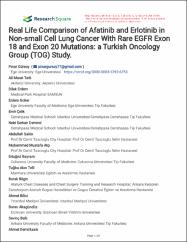| dc.contributor.author | Gürsoy, Pınar | |
| dc.contributor.author | Tatlı, Ali Murat | |
| dc.contributor.author | Erdem, Dilek | |
| dc.contributor.author | Göker, Erdem | |
| dc.contributor.author | Çelik, Emir | |
| dc.contributor.author | Demirci, Nebi Serkan | |
| dc.contributor.author | Yumuk, Perran Fulden | |
| dc.contributor.author | Çavdar, Eyyüp | |
| dc.date.accessioned | 2023-04-20T08:01:19Z | |
| dc.date.available | 2023-04-20T08:01:19Z | |
| dc.date.issued | 2022 | |
| dc.identifier.issn | 0171-5216 | |
| dc.identifier.issn | 1432-1335 | |
| dc.identifier.uri | https://doi.org/10.1007/s00432-022-03984-5 | |
| dc.identifier.uri | https://hdl.handle.net/20.500.11776/10868 | |
| dc.description.abstract | Objectives To compare the survival of first- and second-generation tyrosine kinase inhibitors (TKIs) in patients with rare EGFR exon 18 and exon 20 mutation-positive non-small cell lung cancer (NSCLC). Materials and methods We retrospectively evaluated survival characteristics of 125 patients with EGFR exon 18 and exon 20 mutated NSCLC who received erlotinib or afatinib as first line treatment between 2012 and 2021 from 34 oncology centres. Since exon 20 insertion is associated with TKI resistance, these 18 patients were excluded from the study. Results EGFR exon 18 mutations were seen in 60%, exon 20 mutations in 16%, and complex mutations in 24% of the patients with NSCLC who were evaluated for the study. There were 75 patients in erlotinib treated arm and 50 patients in afatinib arm. Patients treated with erlotinib had progression-free survival time (PFS) of 8.0 months and PFS was 7.0 months in the afatinib arm (p = 0.869), while overall survival time (OS) was 20.0 vs 24.8 months, respectively (p = 0.190). PFS of exon 18 mutated arm was 7.0 months, exon 20 mutated arm was 4.3 months, and complex mutation positive group was 17.3 months, and this was statistically significant (p = 0.036). The longest OS was 32.5 months, seen in the complex mutations group, which was not statistically different than exon 18 and in exon 20 mutated groups (21.0 and 21.2 months, respectively) (p = 0.323). Conclusion In this patient group, especially patients with complex mutations are as sensitive to EGFR TKI treatment similar to classical mutations, and in patients with rare exon 18 and exon 20 EGFR mutation both first- and second-generation EGFR-TKIs should be considered, especially as first- and second-line options. | en_US |
| dc.language.iso | eng | en_US |
| dc.publisher | Springer | en_US |
| dc.identifier.doi | 10.1007/s00432-022-03984-5 | |
| dc.rights | info:eu-repo/semantics/openAccess | en_US |
| dc.subject | Exon 18 | en_US |
| dc.subject | Exon 20 | en_US |
| dc.subject | Erlotinib | en_US |
| dc.subject | Afatinib | en_US |
| dc.subject | Nsclc | en_US |
| dc.subject | Growth-Factor Receptor | en_US |
| dc.subject | Tyrosine Kinase Inhibitor | en_US |
| dc.subject | 1st-Line Treatment | en_US |
| dc.subject | Open-Label | en_US |
| dc.subject | Multicenter | en_US |
| dc.subject | Efficacy | en_US |
| dc.subject | Chemotherapy | en_US |
| dc.title | Real-life comparison of afatinib and erlotinib in non-small cell lung cancer with rare EGFR exon 18 and exon 20 mutations: a Turkish Oncology Group (TOG) study | en_US |
| dc.type | article | en_US |
| dc.relation.ispartof | Journal of Cancer Research and Clinical Oncology | en_US |
| dc.department | Fakülteler, Tıp Fakültesi, Dahili Tıp Bilimleri Bölümü, Radyasyon Onkolojisi Ana Bilim Dalı | en_US |
| dc.authorid | Akin Telli, Tugba/0000-0001-6535-6030 | |
| dc.authorid | SAKIN, Abdullah/0000-0003-2538-8569 | |
| dc.authorid | Gursoy, Pinar/0000-0003-1392-6753 | |
| dc.authorid | Cavdar, Eyyup/0000-0001-5885-3047 | |
| dc.authorid | GOKER, ERDEM/0000-0001-6180-713X | |
| dc.institutionauthor | Çavdar, Eyyüp | |
| dc.relation.publicationcategory | Makale - Uluslararası Hakemli Dergi - Kurum Öğretim Elemanı | en_US |
| dc.authorwosid | Erdogan, Atike Pinar/AFC-3012-2022 | |
| dc.authorwosid | Celik, Emir/GRF-6617-2022 | |
| dc.authorwosid | Akin Telli, Tugba/GSE-4006-2022 | |
| dc.identifier.wos | WOS:000779481900001 | en_US |
| dc.identifier.scopus | 2-s2.0-85127494466 | en_US |
| dc.identifier.pmid | 35381885 | en_US |



















